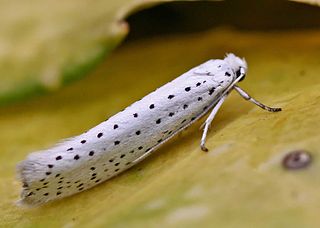
The family Yponomeutidae are known as the ermine moths, with several hundred species, most of them in the tropics. The larvae tend to form communal webs, and some are minor pests in agriculture, forestry, and horticulture. Some of the adults are very attractive. Adult moths are minor pollinators.

Sedella is a town and municipality in the province of Málaga, part of the autonomous community of Andalusia in southern Spain. The municipality is situated approximately 54 kilometres from the provincial capital of Málaga, 23 from Vélez-Málaga and 8 from Canillas de Aceituno. The Sierras of Tejeda, Almijara and Alhama Natural Park is just north of the village.
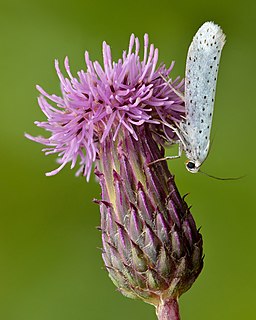
The bird-cherry ermine is a species of moth in the family Yponomeutidae, the ermine moths. The wingspan of the moth ranges from 16 to 25 mm. The insect was first described in 1758 by the Swedish naturalist Carl Linnaeus who gave it the name Phalaena evonymella; it was later transferred to the genus Yponomeuta, becoming Yponomeuta evonymella. The moth can be found in the whole of Europe and the northern and eastern part of Asia.

Yponomeuta plumbella is a moth from the family Yponomeutidae, the ermine moths.
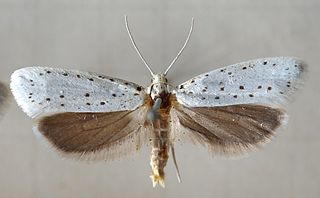
Yponomeuta cagnagella, the spindle ermine, is a moth from the family Yponomeutidae, the ermine moths. The wingspan of the moth ranges from 19 to 26 millimetres. The head is white. Forewings are white; four longitudinal series of few black dots, first not reaching middle, second beginning near before middle, lowest including 4-7 dots ; some additional black dots before termen ; cilia white. Hindwings are dark grey.The larva is pale greyish-yellowish ; spots black ; head black.
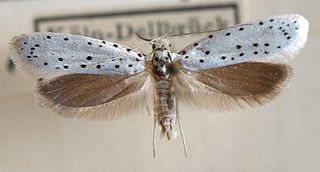
Yponomeuta rorrella is a lepidopteran from the family Yponomeutidae, the ermine moths, probably a migrant, but abundantly found in Britain, mostly concentrated in Northumberland.
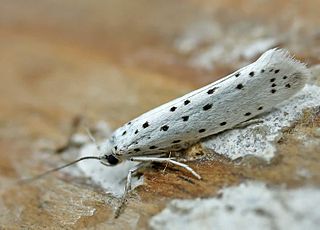
Yponomeuta padella is a lepidopteran from the family Yponomeutidae, the ermine moths.It is also known as the cherry ermine

Yponomeutinae is a subfamily of "micromoths" in the lepidopteran family Yponomeutidae. As their scientific name implies, this is the subfamily containing the type genus of the ermine moths, Yponomeuta. The subfamily has worldwide distribution.

Yponomeuta malinellus, the apple ermine, is a moth of the family Yponomeutidae. It is native to Europe and Asia, and it has spread to North America.
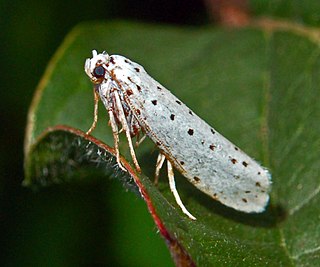
Yponomeuta is a large genus of moths of the family Yponomeutidae. It has 103 described member species.
Yponomeuta albonigratus is a moth of the family Yponomeutidae. It is found in Tajikistan, Uzbekistan, Kyrghyzstan and is also recorded from the Levant.
Yponomeuta myriosema is a moth of the family Yponomeutidae. It is found in Australia.

Yponomeuta irrorella is a moth of the family Yponomeutidae. It is found in most of Europe, except Ireland, Norway, Belgium, the Iberian Peninsula, Estonia and the western and southern part of the Balkan Peninsula.
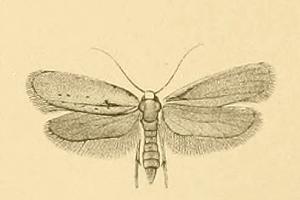
Yponomeuta gigas is a moth of the family Yponomeutidae. It is found on the Canary Islands.
Yponomeuta mahalebella is a moth of the family Yponomeutidae. It is found in France, Italy and Ukraine.
Cauchas sedella is a moth of the Adelidae family or fairy longhorn moths. It was described by August Busck in 1915. It is found in North America, including Colorado.
This page is based on this
Wikipedia article Text is available under the
CC BY-SA 4.0 license; additional terms may apply.
Images, videos and audio are available under their respective licenses.














